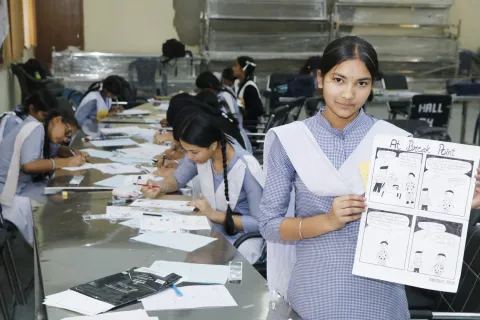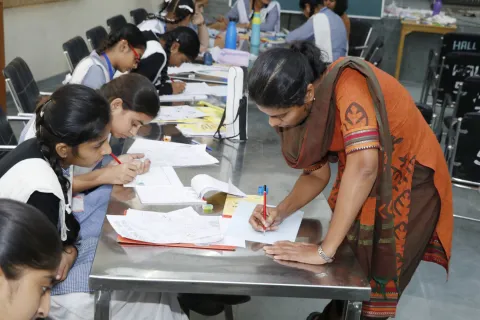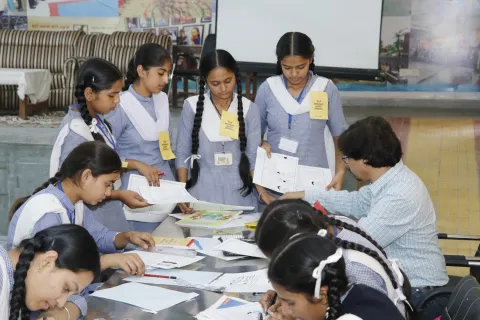Centrient and SaS hosted an AMR comics workshop in Rupnagar, India
It isn't easy to imagine today's world without antibiotics. However, until the 20th century, infections that we now consider straightforward to treat, such as pneumonia and diarrhoea brought on by bacteria, were the number one cause of human death in the developed world. The discovery of penicillin by Alexander Fleming was a game-changer in medicine in the twentieth century. Today, antibiotic medications are essential antibacterial agents widely used in treating bacterial infections. Doctors prescribe them to treat many childhood and maternal infections, common conditions like strep throat, urinary and upper respiratory tract infections, and even as a part of immune suppression therapies, such as cancer treatments and organ transplants. Antibiotics save millions of lives every year.
However, there has recently been an increase in deaths caused by infections, as bacteria are developing resistance to these drugs and evolving into 'superbugs' that are hard to treat. Superbugs are strains of bacteria, viruses, parasites and fungi resistant to most antibiotics and other medications commonly used to treat the infections they cause. As a result, the medicines become ineffective, and infections persist in the body, increasing the risk of spreading to others. The World Health Organization declared Antimicrobial Resistance (AMR) as one of humanity's Top 10 global health threats. Some of the main contributors to AMR include overprescribing antibiotics and patients not finishing their treatments, overusing antibiotics in livestock and fish farming, and environmental causes, including unsustainable wastewater management by pharmaceutical manufacturers and inappropriate disposal of antibiotics that are unused or expired.
The rise of AMR is especially relevant in India. There is a significantly high incidence of inappropriate use of antibiotics and resistance in India due to both easy access and misinformed consumption. While India has been the largest consumer of antibiotics for human health in the previous decade, a recent study indicates that 47% of antibiotics sold in India are unapproved[1]. A unified approach is required to combat the fast-spreading antimicrobial resistance.
We are pleased to be collaborating with and receiving support from Centrient for our mission to stop the rise of superbugs!
Sarah Hyder Iqbal, co-founder and Lead of Superheroes Against Superbugs
In light of this year's World Antimicrobial Awareness Week, Centrient Pharmaceuticals, World Comics India and Superheroes against Superbugs hosted a pilot workshop for school students in India in October and November 2022. Approximately 40 10th- and 12th-grade students from the Governmental senior secondary school for girls in Rupnagar, Punjab, India, attended. During the workshop, the children reflected on the relationship between humans and the natural world, studied the different types of microorganisms and diseases caused by them, and learnt about the basics of antibiotics production and use. The children were then invited to discuss antibiotic resistance through creative and fun hands-on activities, empowering them with knowledge on the issue - games, videos, activity sheets, and role plays. The workshop produced over 50 creative and thoughtful comics on AMR.
“The SaS initiative was created by a group of science communication and engagement professionals to raise public awareness about AMR by partnering with young people in India. At SaS, we recognise young people's role and leadership as key stakeholders in driving awareness and action on AMR. As a result, we design our workshops and engagement programs in such a way that they both educate and empower young people to spread the message in creative and meaningful ways, as well as help identify local solutions. We are pleased to be collaborating with and receiving support from Centrient for our mission to stop the rise of superbugs!" – Sarah Hyder Iqbal, co-founder and Lead of Superheroes Against Superbugs, noted.
November 18th marks the start of the seventh World Antimicrobial Awareness Week. There is a clear need for the industry, academia, policymakers, and the government to take collaborative steps to preserve the efficacy of antibiotics for generations to come. And young people can be changemakers. Join our mission to fight AMR.
[1] Over 47% Antibiotic Formulations Used In India In 2019 Unapproved: Lancet Study (cnbctv18.com)



